Author Archives: Victoria Bateman
Reflections on the March for TPS
On Friday, May 18th, the Haitian Church of the Brethren in Miami, Florida marched down the streets of Miami to call for justice in U.S. immigration policy. I had the opportunity to represent the Office of Peacebuilding and Policy at the march, standing in solidarity with the Haitian Brethren who organized the march.
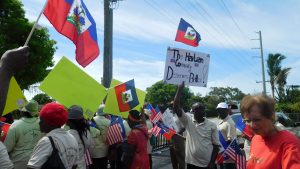
Marchers gathering in front of the Haitian Church of the Brethren Photo: Tori Bateman
A crowd of about 50 people started from the Eglise Des Freres Haitiens in North Miami, marching down a busy street with a police escort. Out of the five days I was in the city, this was the only morning without intense rain- an anomaly we appreciated while marching! The songs of the marchers were punctuated by honks from supportive passerby, and marchers waved both Haitian and American flags. The march ended in front of the Miami U.S. Citizenship and Immigration Services building, where the marchers gathered on the sidewalk to sing and call for just immigration policies.
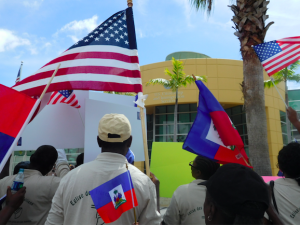
The march ended in front of the United States Citizenship and Immigration Services building Photo: Tori Bateman
To share these legislative solutions with the marchers, our office led an advocacy training on the evening of the march. During the training, I heard from each of the attendees why they care about immigration issues, and shared our office’s work and resources with them. At the end of the session, participants signed petitions that I will drop off at their Senators’ and Representative’s offices in Washington, DC.
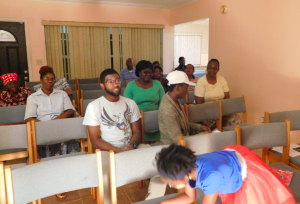
Participants in the advocacy training (photo: Tori Bateman)
Congressional Briefing on Nigeria
On March 22nd, the Office of Peacebuilding and Policy and the Nigeria Working Group hosted a congressional briefing on the topic of returns to the Lake Chad Basin. With the Church of the Brethren’s connections to northeast Nigeria, this topic of returning Nigerians to their home regions is very relevant to our work. Accurate and timely information about the situation in Nigeria is essential for quality relevant U.S. policy in the region.
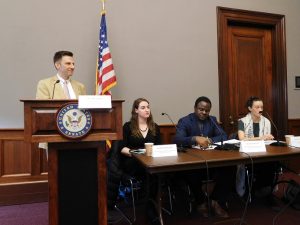
Panelists presented on the topic of returnees and garrison towns in the Lake Chad Basin. Photo by Nathan Hosler.
The briefing was based in part on a report by Refugees International, one of our partners in Washington, DC that does extensive work on Nigeria. Other speakers included staff from Mennonite Central Committee and Search for Common Ground. The report addressed the issue of returnees and garrison towns, and gives recommendations for the various actors in Nigeria to mitigate some of the risks that come with the pressure to return IDP communities to their original homes.
You can find the full Refugees International report here.
One reoccurring theme in the report was the importance of the truth to the success of return policy. First of all, the Nigerian government must provide accurate and timely information on the conditions of regions to which they they plan to return IDPs, and allow the returnees to make the voluntary decision on whether to return to the region or not based on that information. There is fear within the humanitarian community that, because they want to claim successful returns during the upcoming elections, Nigerian officials will force IDPs to return to unsafe areas with inadequate resources and limited accessibility.
The importance of truthful analysis of conditions in IDP camps is also essential to a quality humanitarian response. The report highlights the issue of IDP camp management denying psychosocial support and other support services, because those in charge of the camps want to paint a more positive picture of the crisis situation than is accurate.
Refugees International makes several recommendations to the Nigerian government, including the adoption of an official policy towards IDPs and the creation of a well-planned return strategy that avoids involuntary returns of IDPs. The report also recommends that donor governments continue funding programs in Nigeria.
The Office of Peacebuilding and Policy will continue to coordinate efforts with other Nigeria-focused organizations in Washington, DC to bring these important policy concerns to U.S. lawmakers. The better our policymakers understand the humanitarian and security concerns in Nigeria, the better they will be able to target assistance and peacebuilding efforts in the country. It is important that the United States strive to be a helpful partner to the Nigerian people as they strive towards peace and justice within their communities.
Sowing for Glory
by Nathan Hosler. This post is a sermon from the day after the Going to the Garden Summit.
John 12:24 Very truly, I tell you, unless a grain of wheat falls into the earth and dies, it remains just a single grain; but if it dies, it bears much fruit.
This is basic gardening.
Sowing assumes loss but anticipates great gain. In sowing the sower turns over the precious seed to the dark earth. The seed is hidden from light in secret places where worms roam and the mystery of life takes root. This insight, is, however, general. Anyone with experience or basic understanding of plant stuff will get this. Jesus is going beyond.
Imagery and analogy of plant life abound in scripture. In 1 Cor. 15:36-37 we read:
35 But someone will ask, “How are the dead raised? With what kind of body do they come?” 36 Fool! What you sow does not come to life unless it dies. 37 And as for what you sow, you do not sow the body that is to be, but a bare seed, perhaps of wheat or of some other grain. 38 But God gives it a body as he has chosen, and to each kind of seed its own body. 39 Not all flesh is alike, but there is one flesh for human beings, another for animals, another for birds, and another for fish. 40 There are both heavenly bodies and earthly bodies, but the glory of the heavenly is one thing, and that of the earthly is another. 41 There is one glory of the sun, and another glory of the moon, and another glory of the stars; indeed, star differs from star in glory.
Sowing assumes loss but anticipates a harvest. Sowing is the intentional burying of an object that appears dead and then awaiting the pushing forth of new life. The multiplication of the small to the many. Last year, a sunflower seed that sprouted on its own grew to 8 feet tall with well over 100 hundred blossoms from a single stalk. This growth is mysterious, unexpected, almost uncontrollable—yet also fragile, at times easily destroyed, and precarious. However, the seed must be sown, buried, abandoned, set free.
Sowing the seed of life is the same.
25 Those who love their life lose it, and those who hate their life in this world will keep it for eternal life.
The cost is great but the result surpasses even this. Verse 26 continues, Whoever serves me must follow me, and where I am, there will my servant be also. Whoever serves me, the Father will honor.
Jesus sows with the anticipation of glory and invites us to the same. This is not suffering for suffering’s sake. And it is not personal suffering for personal gain, it is for others. An oft repeated and type of unofficial mission statement of the Church of the Brethren is: “For the Glory of God and for our neighbor’s good.” In James 3:18 also uses the imagery of sowing. The New Revised Standard Version reads. “And a harvest of righteousness is sown in peace for those who make peace.” The New International Version reads “Peacemakers who sow in peace reap a harvest of righteousness.”
If one loses their life (either literally or figuratively) as part of a gamble to save one’s life, then it would seem like the point has been missed. “Gambling”, however, even if one’s motive is clear, does not convey quite the right sense. For, to gamble is to bank on chance, which is rigged so that losing is neigh inevitable. Sowing—sowing is much different. Though it is still not guaranteed success, sowing is done out of trust, resolve, skill, perseverance. The sowing is risky, it is an embrace of the unknown.
This weekend we held a Going to the Garden initiative gathering in New Orleans. This brought Brethren community-based gardeners from around the country to share of their efforts in dynamic (some might say radical) community gardening. Gardening that confronts the displacement of Indigenous peoples, that builds community, that reveals racism and challenges mass incarceration, that, as one gardener describes it “is growing more than veggies.” For some, the congregation eventually told the pastor that they supported him spending as much time as he felt called in the community gardening. One took a Fed-ex night shift so that the daylight hours would be free to garden. Another stayed in the Lower 9th ward after working in disaster response to the hurricane Katrina. People left home to follow the call of God on their lives. Some envision how it may help to reintegrated formerly incarcerated individuals. (In my description you may hear the strains of the “great cloud of witnesses” in Hebrews 11).
A classic text of this giving up of one’s life is Luke 9:23.
“Then he [Jesus] said to them all, “If any want to become my followers, let them deny themselves and take up their cross daily and follow me.”
Sowing assumes loss but anticipates a harvest. Sowing is the intentional burying of an object that appears dead and then awaiting the pushing forth of new life. The multiplication of the small to the many.
5 minutes of silence—Congregational Response—on sowing
Jeremiah 31:31-34
31:31 The days are surely coming, says the LORD, when I will make a new covenant with the house of Israel and the house of Judah.
31:32 It will not be like the covenant that I made with their ancestors when I took them by the hand to bring them out of the land of Egypt–a covenant that they broke, though I was their husband, says the LORD.
31:33 But this is the covenant that I will make with the house of Israel after those days, says the LORD: I will put my law within them, and I will write it on their hearts; and I will be their God, and they shall be my people.
31:34 No longer shall they teach one another, or say to each other, “Know the LORD,” for they shall all know me, from the least of them to the greatest, says the LORD; for I will forgive their iniquity, and remember their sin no more.
The days are surely coming, says the LORD, when I will make a new covenant with the house of Israel and the house of Judah.
A defining characteristic of the new covenant inaugurated by Christ is the breaking beyond ethnic and geographic boundaries. In Ephesians 2 we read.
12 remember that you were at that time without Christ, being aliens from the commonwealth of Israel, and strangers to the covenants of promise, having no hope and without God in the world. 13 But now in Christ Jesus you who once were far off have been brought near by the blood of Christ. 14 For he is our peace; in his flesh he has made both groups into one and has broken down the dividing wall, that is, the hostility between us. 15 He has abolished the law with its commandments and ordinances, that he might create in himself one new humanity in place of the two, thus making peace, 16 and might reconcile both groups to God in one body[c] through the cross, thus putting to death that hostility through it.[d] 17 So he came and proclaimed peace to you who were far off and peace to those who were near;
This “new covenant” is announced already in the prophet Jeremiah. The vision of this passage concludes with:
31:34 No longer shall they teach one another, or say to each other, “Know the LORD,” for they shall all know me, from the least of them to the greatest, says the LORD; for I will forgive their iniquity, and remember their sin no more.
These prophecies have a predictive quality but also a visioning function. They shape the imaginations of the people who seek God. In Baltimore there is the American Visionary Art museum. In DC at the Smithsonian American Art Museum at the Ogden Museum of Southern Art in NOLA there are sections dedicated to “visionary art,” These typical include art works—almost always bright, rather wild, often apocalyptic—which are often based on “visions” and biblical texts. Often these “folk” artists labor for years in insolation, creating. Prophecies such as Jeremiah participate in shaping the imaginations of the people who seek God. They shape the imaginations of the people who seek God. This shaping, however, does not mean that the task, the goal, the bringing of the Peace of Christ is simply up to the will of the church nor the will of humanity but is carried forward by the action of God. It is not simply something that we work juuust a little harder to achieve. The Spirit of God carries it forward.
Of our Gospel passage in John commentators write, “Thus, ‘lifting up Jesus’ is not something contemporary preachers and Christians are charged to do, but something that has been done by God’s act at the cross and resurrection.” (Craddock and Boring, 330).
Our work as a community remains clear: gather to worship God, proclaiming the peace of Christ through word and deed. This ministry of reconciliation seen in 2 Corinthians 5 brings us to reconciling people to God and people to people (as well as all of creation).
These prophecies have a visioning function. They participate in shaping the imaginations of the people who seek God.
Introduction to Human Trafficking
by Doris Abdullah, Church of the Brethren United Nations Representative
The nurse looked at the face of the young girl wrapped from head to toe in white gauze and tape. The chart listed her name as Jane Doe and her age of 12 /15 had a question mark beside it. The policewoman spoke up to say: “Lucky she is alive. We found her in a dumpster beside the highway.”
The above composite of a girl child found beaten and near death occurs all to frequently in rural areas, near small towns and cities around the world. Jane Doe is a victim of human trafficking and she can just as easily be found hospitalized in Cincinnati, Ohio, Lima, Peru, Tokyo, Japan, Melbourne, Australia, Jos, Nigeria, Bangkok, Thailand, Santo Domingo, Dominican Republic, Ghouta, Syria or Moscow, Russia. Human Trafficking, also known as Modern Day Slavery, is a worldwide phenomenon. Slavery and slavers taskmasters are as old as human civilization. Modern day Human Trafficking is driven by high demand, high profits and low risk. The high demand comes from manufacturers making shoes and clothes, agriculture producers, corporations in mining, small fisheries, and the demand for body parts and sex. The United Nations Office on Drugs and Crime and other reporting agencies estimate the worldwide profit for Human Trafficking to be as high as $150 billion annually. (1)
It is not possible to consent to slavery. A trafficked person is devoured of personal freedom. The trafficked person is bought and sold against their will. Violence and the constant usage of violence is the weapon of trafficking. Trafficked persons are held in forced bondage for exploitation. When violence does not restrain, slaves are held by ropes, handcuffs, in cages and chained under locks and keys. The trafficked person’s loss of freedom comes by means of forced abduction, fraud, deception and/or coercion. Trafficking is the complete control over another person for the sole ill purpose of exploitation. The traffickers uses their human bondage until they are used up thereby condemning the trafficked person to death. The only way out of bondage is to escape or be rescued.
Slave auctions are mostly held in secret, but law enforcement have carried out trafficking raids in exclusive hotels and even in the VIP lounges of major airlines in cities around the globe. In addition auctions over media are used for clandestine advertising and specification on types of slaves’ available. The media is also used to lure children, girls and women into slavery. Girls and women are often lured by the false promise of a job and a better lifestyle. Girls and women represent 79% of the trafficked victims world wide. The high demand for a large supply of slaves has resulted in more than 30 million persons being held in human bondage across our world. Some United States reporting from 2012 to 2016 estimated 600,000 to 800,000 persons being trafficked within the country. (2) The overwhelming amount of those trafficked in the US are females and half of the females are estimated to be children. If we use the high of 800,000 and 80% of them females, we are speaking of 320,000 slave children in the United States. (3)
Trafficked children and women for sexual exploitation are not sex workers. They are sex slaves and they are victims of exploitation. Abducted and seduced children are robbed of an education, stunted in their physical growth and robbed of their childhood innocence. They are used for child prostitution and in child pornography and child labor. Children born of rape, poverty, disabled children and runaway children are most vulnerable to be trafficked. Children are also easy to discipline and are usually to afraid to complain or escape from slavery. Abducted and coerced females are forced into prostitution. Slave women are often tattooed which further diminishes them as a human being and serves as a reminder that they are the property of others. The Convention for the Suppression of the Traffic in Persons and the Exploitation of the Prostitution of Others UN General Assembly resolution Preamble states: “Whereas prostitution and the accompanying evil of the traffic in persons for the purpose of prostitution are incompatible with the dignity and worth of the human person and endanger the welfare of the individual, the family and the community.”(4) Sex trafficking in children and women has been estimated to be a $100 billion dollar a year industry.(5)
Girls and women are also abducted, trafficked and forced into early marriage and domestic servitude. Undocumented and even documented females are vulnerable to exploitation as domestic slaves, because of deportation fears, language barriers among migrants and immigrants in addition to being debt bondage victims. The demand for labor in the agriculture sector drives males and females trafficking in the United States. Domestic or labor, the slave is paid for only one time, and the cost of a slave is cheaper than paying wages. The US Department of Health and Human Services (HHS) for the period 2013-14, show an increase in trafficking for labor, just slightly behind sex trafficking.(6) 63% of the data show that the slaves were men. Violence, playing on the immigration status as well as perpetual debt when wages were paid. The producers and miners impose fees for mandatory transportation, food, communication and housing cost which prevents indebtedness and freedom from ever being realized for those entrapped in bondage.
Men makes up 82% of those trafficked for organ removal. Organ trafficking has been reported to be greatly under reported and remain hidden underground. The skill set involved to remove organs involved the criminal help of professionals from the medical sector. The demand for organs far out pace the supply. The US Department of Health and Human Service from January, 2014 reported: 120,999 persons were waiting for organs, but only 10,587 donors were registered. (7)
The face of Human Trafficking display gender-based violence and cultural norms in addition to pay gap, gender poverty, lower employment opportunities, and women employment in unregulated and informal sectors as domestic helpers and agricultural which increase their vulnerability to trafficking and exploitation in our industrialized country. A citizen that was made aware of human trafficking made these remarks. “I never thought there was human trafficking (in Ohio). The problem was in front of my eyes. I just did not pay attention.” (8) We all must open our eyes and become aware of Human Trafficking. Stop Human Trafficking
References
1. UNODC United Nations Office on Drugs and Crime Global Trafficking Report
2. Human Rights Trafficking Fact Sheet NO 36
3. The Inter-Agency Coordination Group against Trafficking in Persons
4. Protocol to Prevent, Suppress and Punish trafficking in Persons, especially women and children, Supplementing the UN Convention against Trans National Organized Crime, 2000 (Trafficking Protocol)
5. UNODC United Nations Office on Drugs and Crime Global Trafficking Report
6. Country Profile North America Trafficking GLOTIP 16
7. HHS The US Department of Health and Human Services
8. HTS-2016-Annual Report-Ohio Trafficking
Other References
1. Report of the Special Rapporteur on the Sales of Children, Child Prostitution and Child Pornography in the United States Najat Maalla M’Jid
2. Terminology Guidelines for the Protection of Children from Sexual Exploitation and Sexual Abuse Adopted by the Inter-agency Working Group in Luxembourg 28 January 2016
3. US State Department Document Report 2016
4. ILO International Labor Organization
5. Human Trafficking Trends (Polaris Project)
Guantanamo Bay
Response to the National Security Strategy
“Out of love toward victims of poverty, oppression, and violence, we are called to earlier, more profound, and more lasting efforts to address the conditions that gives rise to violence. Our church should press for more effective preventive diplomacy to defuse rising tensions before they erupt into war, more serious economic development to avert desperate conditions, and more concerted peacebuilding to weave new strong social fabrics that cross boundaries of race, class, religion, ethnicity, and nationality. We have abundant though underused evidence that where socio-economic cooperation occurs, former adversaries study war no more. We believe our church, nation, and the UN, should focus on such measures to achieve equity and justice. As equity and justice increase, new social stability and deepening commitment to community can reduce the occasions for military interventions.”
“The Church of the Brethren believes that, although national sovereignty may serve good purposes, it may also tempt us to idolatry, in which we serve the gods of national power and wealth rather than the God of love calling us to care for “the least of these” throughout the world. Nationalism wedded to militarism is a particularly harmful idol because it obstructs genuine respect for others and the growth of world community among all of God’s creation. If we do not bow down to today’s idols, we can through the grace of God be loving without killing.”
He said:3 “Blessed are the poor in spirit,
for theirs is the kingdom of heaven.
4 Blessed are those who mourn,
for they will be comforted.
5 Blessed are the meek,
for they will inherit the earth.
6 Blessed are those who hunger and thirst for righteousness,
for they will be filled.
7 Blessed are the merciful,
for they will be shown mercy.
8 Blessed are the pure in heart,
for they will see God.
9 Blessed are the peacemakers,
for they will be called children of God.
10 Blessed are those who are persecuted because of righteousness,
for theirs is the kingdom of heaven.
Insights from Peacebuilders Around the World
Justice is coming! It is Jesus.
by Nathan Hosler, director of the Office of Public Witness
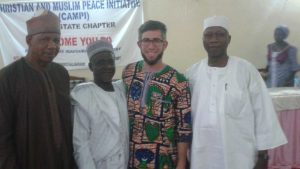
Christian and Muslim Peace Initiative (CAMPI) inauguration in Maiduguri. Photo credit: Silas Ishaya
2 Peter 3:8-15a
Isaiah 40:1-11
Anticipation. Waiting. Agonizing? Uncertain. Advent—waiting for the promised One. On Thursday, while I was in northeast Nigeria, we rose early for our 3-4 hour drive and hit the road. Rutted. Through dry, mostly flat land with low trees except for the palms. Security checkpoints with men with big guns and barricades. Road blocks of barrels or tires or logs at checkpoints which jut, maybe half way, into the road. These alternate—one from the left, right, left, right—which slows traffic. This traffic slowing strategy is also used through villages which are lined with market stands. This works-sort of- but at times it generates a certain careening as cars coming opposing directions navigate as quickly as possible. While we barreled through one such obstacle course a gas tanker kept pace with us leading our way, weaving wildly, looking a little like the Joker in Batman driving the tractor trailer. Then, passing Gombi, we tighten a bad sounding wheel before engaging the long smoother straightaways (regularly hanging at 85 miles an hour) to Yola and the airport. As a mere passenger rather than driver, I wait. Bracing myself, observing, talking—but waiting.
My last 5 in-country flights have been delayed but just in case this one isn’t we get there early enough. They aren’t boarding yet and aren’t even checking us in. So, I wait. It’d be nice to be productive, but the uncertain waiting is distracting. Once the check-in begins, it will be a scramble. Anticipation. Sort of poised, ready. No word on the delay, but that the harmattan dust in the air from the Sahara is too thick. Another flight arrives…hope is sparked. The airport assistant guy, Abdul, suggests I might want to get a seat on this flight. Wasn’t sure, but they were filled anyway when he checks. Maybe an hour or so later it is starting to get uncertain if we will get out before they shut down flights. I text him and ask for my paper ticket print-out so that I have it if he leaves. Not minutes later, they begin checking in. He makes a mad dash towards me across the empty room to retrieve the paper and dives into line. Our hope is restored. Anticipation. Checked in. Through security. Waiting. One hour. Maybe another. Text the Ambassador to say I’ll probably miss our meeting.
Then high above, through a strangely garbled PA system, something is announced. Through deciphering or sleuthing we learn that the flight will arrive from Abuja by 5:50 pm (flight was to depart by 12:15). Relief. Hope at the first bit of information passed on to us in 6 hours—the masses who wait. 5:45. 5:50. This is the story of Advent. Of the waiting and expectation of the coming Messiah who will free the captive, heal the blind, cast off the oppressor, and proclaim reconciliation with God.
Another slightly less garbled but still incomprehensible announcement. A young messenger of doom walks around and confirms. The flight has been canceled. Which means I also miss my flight home.
At the time of writing parts of this I remain in the anticipation of both Advent and getting a flight home. Though we are still weeks from the coming of Jesus, we may remember from last year that we will not be disappointed. The messengers will not be my young airport messenger of doom but the angels to the shepherds. But that is getting ahead of where we are today. Today we wait.
Our passage is 2 Peter 3:8-15a.
8 But do not ignore this one fact, beloved, that with the Lord one day is like a thousand years, and a thousand years are like one day.
The passage begins by challenging our notions of God’s time and patience. If 1000 years = a day for God, then what does that break down to per minute? Per second? However, if a day is like a thousand years then what does that mean as the reverse? This sounds less like a common math problem (unless of course this is what one learns if one majors in math) and more like the Matrix or Inception, movies in which time and space bend in unusual ways. This is not simply asserting that God experiences time in a very accelerated or very slow manner.
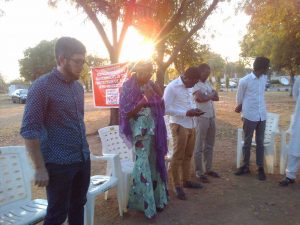
Photo Credit: Nathan Hosler
This number 1000 came back to me this week while I was at the daily—that is every day at 5:00 at the Unity Fountain next to the Transcorp Hotel in Abuja—vigil marking the abduction of the school girls from Chibok. This past Monday was 1330th day. Today, Sunday December 10th, is 1336 days. How has God experienced these days? There is some old-timey philosophy that Christians have occasionally been influenced by that states that the divine must be above change and above being influenced by the merely human. Our God, however, (which is most scandalous), becomes incarnate and joins us in our existence and joy and pain.
That Jesus is coming (since we are in advent we refer to it in the future) and will show up in this world as God incarnate—God having taken on flesh and blood and pain and joy—that this is our God then means that God has not been distant from us nor the school girls of Chibok these 1336 days. Jesus came healing and serving and feeling and calls us to the same—or should I say, will call us to do the same once he is born.
Jesus, and thus God, is not above pain and the agony of the kidnapped and their families but with them. God is with us. God is with you. This is a type of hope. The passage continues on, expounding on the timeliness of God.
9 The Lord is not slow about his promise, as some think of slowness, but is patient with you,[a] not wanting any to perish, but all to come to repentance.
The Lord is not patient out of lack of concern but as an act of mercy. The act of mercy which allows for repentance. This call to repentance is both urgent and marked by delay. Delay for repentance and turning. There are many horrible things in this world. I noted the Chibok Girls. There have been many others. Dr. Rebecca Dali has, during her work of humanitarian relief, collected some 4,000 names, dates, and locations of people abducted.
On my flight back from Maiduguri I was wearing my Office of Public Witness t-shirt. On the back is our tag line—“Seeking to live the peace of Jesus publicly.” The man sitting beside me said he liked it…it turned out that he was EYN. We talked for the whole flight to Abuja about his research in public health and how people cannot access it. Towards the end I learned he has 4 children. The youngest is a boy and named after his father. Even later in the flight he revealed that his father had been kidnapped and killed. Not by Boko Haram but by the Nigerian military.
So, when the Office of Public Witness works with the Nigerian Working Group which we convene on military accountability and human rights, raising concerns about the sale of weapons by the US, it is not an abstract thought. It is not a sterile appeal to theoretical legal frameworks, which are useful and regularly used, but it is because we follow a God who feels the pain of people and calls us to a ministry feeling this pain—and then acting in response. God’s patience is for repentance. God’s patience is for repentance. Jesus, the one whose birth we anticipate in advent, is the embodiment of this justice.
10 But the day of the Lord will come like a thief, and then the heavens will pass away with a loud noise, and the elements will be dissolved with fire, and the earth and everything that is done on it will be disclosed.
Note that this dissolving is not simply destruction but a process of revealing. It is a disclosing of acts done. Because of this we should live accordingly. Because of this we can also trust that acts of injustice will be brought to light.
11 Since all these things are to be dissolved in this way, what sort of persons ought you to be in leading lives of holiness and godliness, 12 waiting for and hastening[c] the coming of the day of God, because of which the heavens will be set ablaze and dissolved, and the elements will melt with fire? 13 But, in accordance with his promise, we wait for new heavens and a new earth, where righteousness is at home.
Where righteousness is at home. Righteousness can also be translated justice. “We wait for a new heavens and a new earth, where justice dwells”
14 Therefore, beloved, while you are waiting for these things, strive to be found by him at peace, without spot or blemish; 15 and regard the patience of our Lord as salvation.
Because of this being made known—this revealing work—we recognize that that this is good news for those on the side of justice. However, it is concerning for those who are not. Advent is the marking of the coming of Jesus—the justice of God. This is the good news that the angels will proclaim. While this is concerning for some—which may be us—we should consider the patience of the Lord as our salvation. So, this coming and revealing is good news for both the just and unjust for both the righteous and unrighteous.
The patience of God leaves room for repentance. This is not the same as those clergy whom Dr. Martin Luther King Jr. rebukes. It is not patience in the face of wrong. There is both a patience leading towards repentance and an impatience with abuse. “everything with be disclosed” in the last day–God reveals what is hidden and brings to justice.
Comfort, O comfort my people,
says your God….
3 A voice cries out:
“In the wilderness prepare the way of the Lord,
make straight in the desert a highway for our God.
4 Every valley shall be lifted up,
and every mountain and hill be made low;
the uneven ground shall become level,
and the rough places a plain.
5 Then the glory of the Lord shall be revealed..
Mist-like: Reflecting on James in the Middle East
By Nathan Hosler, Director of the Office of Public Witness
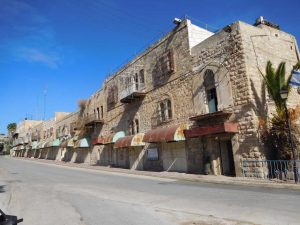
The permanently closed Shuhada Street in Hebron. Photo credit: Nathan Hosler
James 4:13-5:6
Writing this, I was sitting on the Mount of Beatitudes overlooking the Sea of Galilee. Below me, closer to the water, on my left and right are spots that mark many significant points in Jesus’ ministry. The ancient village of Capernaum, a chapel marking the Primacy of Peter, and a chapel with the famous mosaic of two fishes and five loaves from the year 480- marking the spot where Jesus multiplied these meager foods and fed the crowds. In Capernaum there is a house that then became the site of a church in 5th century. The house is thought to be that of the mother-in-law of Peter where Jesus would stay and where the mother was healed. It was also the site of one of the earliest house churches. Maybe 50 yards away there is the remains of a synagogue for the Byzantine period. This synagogue is built with stone imported from Jerusalem but built on an earlier foundation of local basalt stone—Some archaeologists assert that this earlier synagogue is from the time of Jesus.
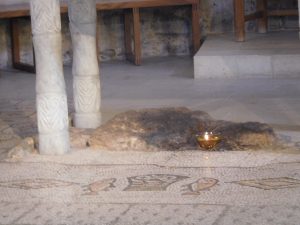
A mosaic of the two fishes and five loaves. Photo Credit: Nathan Hosler
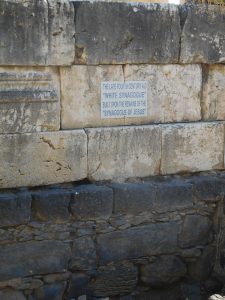
Byzantine Synagogue with the “Jesus Synagogue” beneath. Photo Credit: Nathan Hosler
To my left (to the north) 20 miles is Syria whose civil war and refugee crisis require no introduction. Back south is the West Bank of the Palestinian territories. Most of the week to this point has been hearing from an assortment of political, religious, NGO, and peacebuilding workers struggling in a situation of conflict that feels rather intractable. The significance of the land both present and past is of incomparable magnitude.
Along the way I have been reading and meditating on our passage in James.
13 Come now, you who say, “Today or tomorrow we will go to such and such a town and spend a year there, doing business and making money.” 14 Yet you do not even know what tomorrow will bring. What is your life? For you are a mist that appears for a little while and then vanishes. 15 Instead you ought to say, “If the Lord wishes, we will live and do this or that.” 16 As it is, you boast in your arrogance; all such boasting is evil. 17 Anyone, then, who knows the right thing to do and fails to do it, commits sin.
Narrowly, this and the following verses are about wealth. I think, however, that money stands in for the assumption that we are in control or our desire to be in control. Though God (and the world with its histories and cultures) are big, you are misty—mist-like, ephemeral. This assertion is not negative, not an insult, it is simply honest. Though those of us who are at least relatively well-off may forget this, our lives are indeed contingent. Our lives are dependent. They are based in God. James addresses the one who confidently says they will do this or that. The hearers of the letter of James were likely not the well off—or the overly wealthy. So, it may not be that this or the next portion are as directly applicable to the immediate crowd. The general assertion, however, is very applicable, hence its inclusion. To those who are well confident that their plans will succeed, James asserts—you are mist—misty—mist-like in the fleeting quality of your life. Because you cannot know what will happen you should always acknowledge that even the best laid plans rest in God. The habit and practice that James exhorts is to, in all things, acknowledge that one’s life is held in God.
Your existence is in God.
As I’ve been reading James I have also been thinking about a similar passage in the Sermon on the Mount. Given my writing location if felt particularly relevant to note this. In the sixth chapter of Matthew, Jesus teaches: Why worry about your life?—about what you will eat or drink or wear. Are not the flowers of the field more splendid than Solomon, the most extravagantly dressed of all kings?
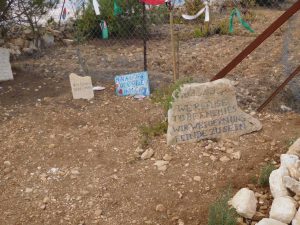
A sign outside the Tent of Nations that reads, “We refuse to be enemies.” Photo credit: Nathan Hosler
The sign by the entrance says, “We refuse to be enemies.” The Tent of Nations (http://www.tentofnations.org/ ) is a Palestinian farm on a hill top in area C. Area C is part of the West Bank, the land of the future Palestinian State. It is also the site of many settlements, which are illegal under international law, undermining the possibility of a future state, and more like towns or cities than anything makeshift that is indicated by the term “settlement.” To get to the Tent of Nations we left our van and climbed over boulders that have been placed on their road a few hundred meters from their farm in order to impede access. The farm is on a hill top. Every other hill top surrounding has a massive settlement.
We met with Daoud Nasser whose family has lived there for generations. Unlike most Palestinians whose land is at risk they have a clear line of documentation of land ownership going back to the Ottoman Period in the early 1900s. Since the land is documented but still deemed very desirable, they have been fighting in courts since the early 1990s. The case keeps getting passed back and forth between the Supreme Court and Military courts. They must keep fighting and filing because if they don’t they will be forced out. They can’t build any new structures and the structures they have—even the tent like structures—have demolition orders on them. Daoud Nasser, though, seems to be full of joy. He told of their struggle just to keep their family’s land. He demonstrates a trust in God and in others to continue on.
Again, your existence is in God. You are mist-like but God is steadfast.
Unsurprisingly, the rich also have this problem. They also easily forget that their existence is in God.
Come now, you rich people, weep and wail for the miseries that are coming to you. 2 Your riches have rotted, and your clothes are moth-eaten. 3 Your gold and silver have rusted, and their rust will be evidence against you, and it will eat your flesh like fire. You have laid up treasure for the last days. 4 Listen! The wages of the laborers who mowed your fields, which you kept back by fraud, cry out, and the cries of the harvesters have reached the ears of the Lord of hosts. 5 You have lived on the earth in luxury and in pleasure; you have fattened your hearts in a day of slaughter. 6 You have condemned and murdered the righteous one, who does not resist you.
James doesn’t discuss if there are righteous ways to be rich. Certainly, our congregation isn’t rich compared to much of Capitol Hill. Because of this and certain prophetic inclinations we may find it easy to speak critically—to speak “prophetically.” However, though we are not that rich we are comparatively rich in relation to much of the world. And as such may be indicted.
The rich people that James addresses have built their riches on the backs of others. For white America the legacy of slavery of Africans and genocide of Indigenous communities is a clear example. But also, immigration, trade, and foreign policy often continue this pattern.
What we don’t know is if James has certain rich folks in mind or assumes that all those who are rich have earned it through injustice. It is also unclear if the “rich” are those who meet a certain income bracket (which seems unlikely) or if it is short-hand for those in power. This call is a call to repentance. It is a call towards being rightly oriented toward God and others. The call to repentance and to acknowledging that one’s existence is based in God rather than in one’s own might or smarts or good looks or cunning is not against but for the one being challenged. Only when you care about that person or entity can you fully embrace the uncomfortable confrontation. Repenting of this is in the interest of both the oppressor and the oppressed.
Let’s suppose that riches and power are somewhat interchangeable. During the past two weeks the question of power and who is criticized in what manner has been close at hand for me. For Palestinians living under Israeli occupation the restricted rights, living under military law, limited ability to move freely, and lagging infrastructure is clearly unjust. For many Israelis their existence as a small country surrounded by the much bigger and often hostile Arab world, history of the Holocaust, and repeated abuses throughout history lead to a strong emphasis on “security” at any cost. Many wars in the past decades as well as an enforced separation which does not allow interaction with Palestinians in normal life keeps these fears alive and well.
One morning on this trip we met with Defense for Children International. They explained that there are 500-700 cases of Palestinian children being convicted in Israeli military courts. Many times, the kids (usually but not always boys) are arrested from their beds at night. Regularly they are beaten on the way. Harshly interrogated. And sign confessions written in a language which they can’t read in order to get out sooner. Rarely can they see their parents or actually meet with a lawyer to know their rights. Because of this work of documentation and exposure DCI is declared an enemy and traitor of the state of Israel because it highlights these abuses. Many Christians in the US would harshly criticize me for repeating these things—claiming that the Old Testament commands me to “Bless Israel.” However, as noted earlier, criticism is not the opposite of blessing. Criticism may be part of blessing.
Even as I recount these few notes from an hour long meeting I think back and begin to feel overwhelmed. And this was only one meeting out of the whole week. It is easy to feel the mist-like character of my life when held up against the enormity of the world. The enormity of the ancient stones and places of Jesus. The enormity of Syria just down the road. The enormity of the so-called Israeli and Palestinian conflict. I’m not sure that this is what James intends, but getting to the point of realizing our mistiness—our mist-like nature—is half the struggle. The second half is recognizing that our existence is in God. We are mist but our existence is sustained by the God who has mysteriously created us and called us. Our existence is in the God that has created and called us beyond ourselves.

